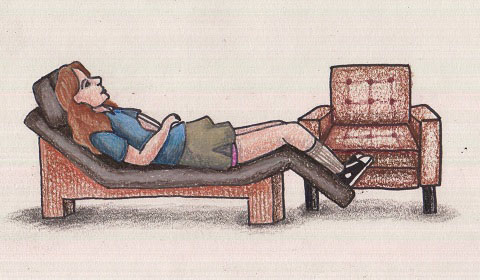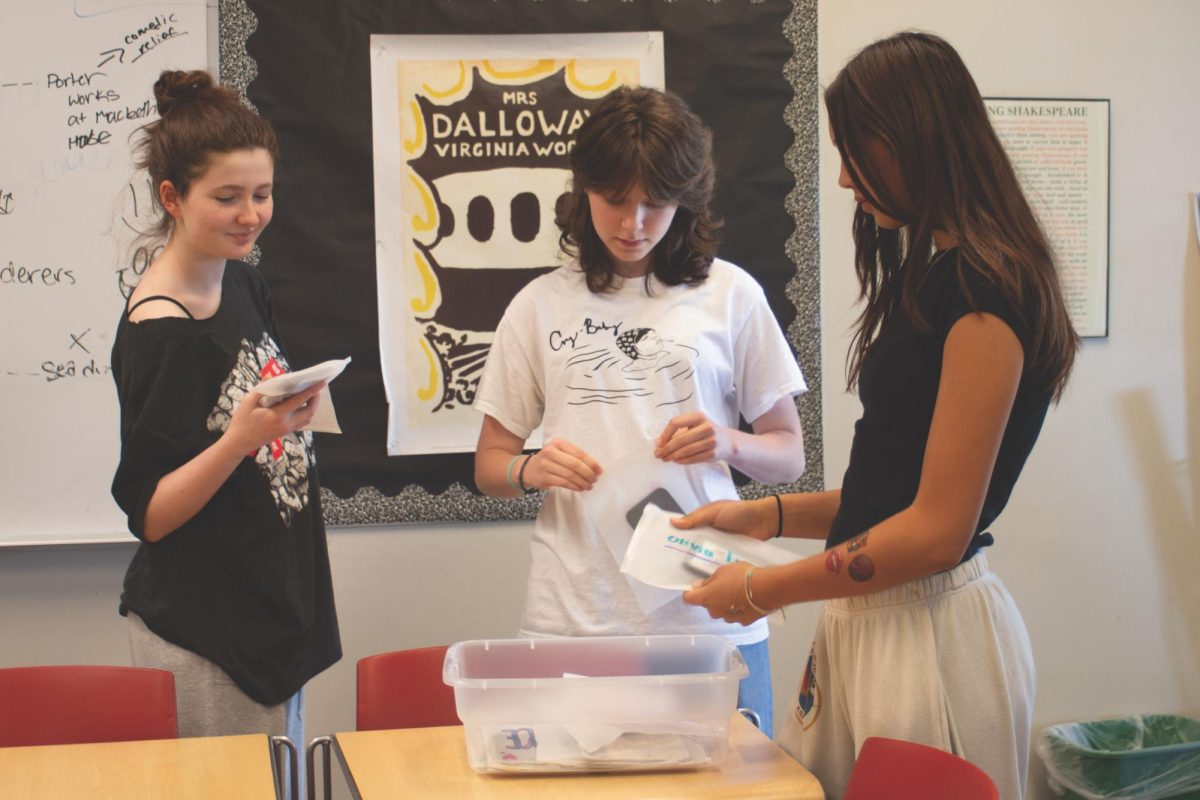
By: Clarissa ‘ 15 and Margaret ’15
During her freshman year at Marlborough, Dana’s* grades started to decline, and she lost the motivation to participate in everyday activities. Depression set in. Last year, Dana spent 72 hours in a state facility mental hospital after accidentally overdosing on tequila, Xanax and aspirin. Her depression was so severe that she enjoyed the possibility that the medication might accidentally kill her.
After leaving the mental hospital, she had a nervous breakdown and locked herself in her bedroom. Her therapist drove her to the Inpatient Acute Rehabilitation Division at the Ronald Reagan UCLA Medical Center, where she spent a month recovering. The Westwood facility disallowed even the most seemingly trivial items, such as shoelaces and electronics. To protect suicidal patients from killing themselves, the shower heads were recessed into the walls and the bathrooms remained locked at night.
“I had my friends tell people I had mono,” Dana said. Although she is back at School, Dana still sees a therapist.
What led to her collapse?
Most Marlborough students said they experience a copious amount of stress from what they consider an unusually high workload coupled with elevated expectations from both parents and the School. While not all girls react to this pressure by harming themselves, some girls see therapists outside of School and connect that need to their abundance of stress.
Although the School organizes relaxing events like potlucks and has recently redesigned the schedule to alleviate the workload, some girls do not think enough in-school therapy is provided. But is this simply because students at most high schools do not feel comfortable seeking counseling on campus? Could the rigor of attending Marlborough really be responsible for behavior as alarming as developing an eating disorder or falling into the depths of depression?
Some argue that girls cause their stress themselves by overloading their schedules, but others contend the School causes unnecessary stress. Studies have shown the single-sex environment may be to blame, as it leads girls to focus more on achievement than on social status. But is the pressure at Marlborough unique, or does a the mentality of pushing oneself past the limit in order to get accepted into the top colleges affect all independent schools?
Seeking Support
Though the School believes it has made efforts to a create a supportive environment, many girls seek assistance outside of School in therapy and some have questioned if mental health options at Marlborough are limited, discouraged or inaccessible.
Director of Upper School and Assistant Head of School Laura Hotchkiss said she thinks that Marlborough, as a small, open community of 530 girls, has more awareness of students’ emotional states than other independent schools in the city. Director of Middle School Robert Bryan agreed, saying that he believes that students know that the School is willing to assist them.
“Our experience would indicate that sometimes students are comfortable coming to us, and even if they are not, [their] friends may be,” Bryan said. Hotchkiss mentioned that if a parent or student expresses concern about feeling overwhelmed, she will meet with the student and help her figure out ways to proactively reduce stress. But some students feel that they have to keep their problems to themselves, suggesting that many girls do not realize that the School expects them to reach out for aid. “If I had felt that I could have told somebody in the community or felt the comfort that there would be some sort of cushion if I shared, I could have avoided some of [the emotional instability],” Dana said. Hotchkiss also said she thinks girls have resources to go to for support, such as a Grade Level Dean, advisor or teacher, but Lauren ‘15 disagreed.
“Not a lot of students tell the Dean what’s going on,” Lauren said. “What can the Dean do? If the opportunities aren’t given or announced, there’s no way that it’s going to help us.” Lauren also said that she believes Marlborough does not teach students how to cope with stress, adding that the School could implement a program similar to Harvard-Westlake School’s student-run Monday night peer support program, in which seniors and juniors advise other Upper School students.
Bryan mentioned the School has considered peer support programs, but they require a considerable amount of training to run effectively. The School does, however, provide some official therapy, as girls have the option of seeing School Counselor Emily Vaughn or joining ‘Vive,’ the monthly group therapy sessions led by two out-of-school psychologists, where Upper School girls can discuss anything they may have on their minds with girls in their own grade. Between five and 15 girls from each year participate each month.
However, many girls prefer to seek assistance outside of School, according to therapist Michelle C. Fogli, who co-leads the ‘Vive’ sessions.
“It’s pretty average in that all of the girls that I see who go to a good school… don’t want to use the resources available in their schools because they don’t trust them as confidential,” Fogli said.
Though some students seem to think that Marlborough does not have adequate help, or that this help needs more promotion, Alison Dinerstein, mother of Zoe ’13, said she feels sure that aid at School is accessible and that the faculty and administration are supportive, though many girls may not take advantage because admitting the need for assistance can be difficult.
“Even the idea that they bring in ‘Vive’ seems like a commitment to helping and having people available,” Fogli said. “That to me is a lot bigger commitment than other schools are showing.”
Sources of Stress
Some students claim that the culture of the School itself is to blame for girls’ additional tension and anxiety, but others assert that the girls themselves may unconsciously be responsible as well.
Hotchkiss acknowledged the challenge of finding ways to help manage girls’ stress but said that she thinks the School has made an effort to reduce the pressure. Other teachers, including history and social sciences instructor Mike Rindge, agree.
“I think that the School tries to be very thoughtful and aware about the levels of stress, and I know the faculty discuss it quite a bit,” he said.
Despite changes to the schedule, community events such as Spirit Week, Movie Nights planned by All-School Council and traditions such as the 10th Grade Banner Presentation, several students said they think that Marlborough does not offer enough effective ways to reduce stress.
“Teachers and faculty… always talk to us about stress relief, but they are not actually doing anything about it,” Janet* ’15 said. However, do students contribute more than they think to their own emotional strain?
Several girls interviewed said they feel that many students simply do not admit to having trouble, which in turn generates more anxiety. “You’re supposed to basically be perfect, so if you do have issues you don’t tell them; you want to keep up the pretense that you’re happy and normal,” Dana said. She further explained that she believes girls feel pressure to participate only in activities or extracurriculars in which they excel, in order to avoid feeling inadequate.
Millar also mentioned girls’ high expectations for themselves as a potential cause of stress. He also said, however, that both parents and students have asked the School to offer more AP classes, which he feels sure would result in an increased amount of pressure. Though girls’ high expectations for themselves may contribute to unwanted anxiety, many students said they believe that the School is to blame for their emotional strain.
“I feel that Marlborough plays [its reputation] up and encourages this competition between students, and this causes stress,” Lauren said.
However, according to Alison Dinerstein, the School should not be entirely responsible. Millar agreed, saying that he thinks most of the efforts to reduce stress come from students. He cited the student-initiated ultimate frisbee and flag football clubs as examples, but added that students may not always follow through on plans they wish to implement.
“Students have ideas, but they’re used to having an idea and having someone else execute it.”
Are We Unique?
While some students and faculty suspect that Marlborough’s high expectations and all-girls environment cause a higher amount of stress than that of our peer institutions, many parents and therapists believe that all independent schools exert equal pressures on their students.
Katie ’14 mentioned that the workload, which she estimated takes about four to six hours a night to complete, has affected many of her classmates negatively.
“I think that the School doesn’t really help people cope because they assign a lot of work in each class, more than other schools,” she said.
But Fogli said the stress that Violets feel is similar to that of other teenagers and is not particular to the School. “For the most part, [the pressure and stress that] everyone feels [are] problems typical of upper middle class girls going to a private school,” she said. Many students, however, including Olivia ’15, said that they feel Marlborough’s uniquely competitive environment causes stress beyond what their friends at other independent schools are experiencing. “It causes so much stress and anxiety for [Marlborough girls] when they think that they are not doing enough when they are actually doing a ridiculous amount compared to everyone else at other schools,” Olivia said.
Rindge agrees that the stress and competition he sees from Marlborough girls is more than at other schools he has taught at. “I… think an aspect of competition here, in terms of grades and college, is something that adds to [the stress level, which] is more that I have seen in other schools,” Rindge said. Some girls, such as Lauren, said they feel that the all-girls environment of Marlborough affects the stress level, saying that without boys there are fewer distractions from stress. “It plays up the cattiness of the girls because there are no boys to impress or to hide emotions from,” Lauren said.
Stacy* also said she thinks that the single-sex environment increases stress. Hotchkiss, however, said she believes that Marlborough’s stress level is equal to that of any other independent school in the country.
“I think that when you are in a community of high achievers and students and families that have incredibly high aspirations and goals for the students, it’s going to be a place where there is stress,” she said.
*Names have been changed for all sources without last names.



















anon • Feb 6, 2013 at 3:33 pm
“We are the girls with anxiety disorders, filled appointment books, five-year plans. We take ourselves very, very seriously. We are the peacemakers, the do-gooders, the givers, the savers. We are on time, overly prepared, well read, and witty, intellectually curious, always moving… We pride ourselves on getting as little sleep as possible and thrive on self-deprivation. We drink coffee, a lot of it. We are on birth control, Prozac, and multivitamins… We are relentless, judgmental with ourselves, and forgiving to others. We never want to be as passive-aggressive as our mothers, never want to marry men as uninspired as our fathers… We are the daughters of the feminists who said, “You can be anything,” and we heard, “You have to be everything.”
-Courtney Martin
http://www.michelepolak.com/WMST100fall10/Weekly_Schedule_files/martin.pdf